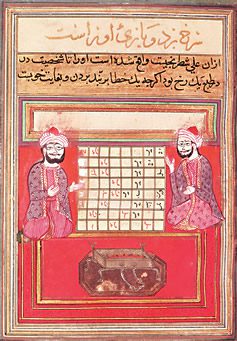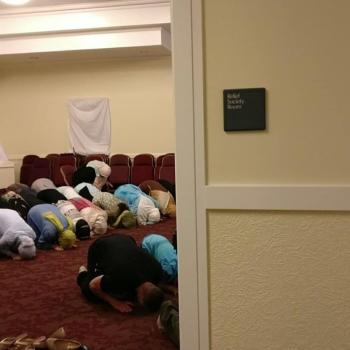
(Wikimedia Commons public domain)
A bit more fun with words:
Changing gears, it is worth noting that many terms connected with warfare have entered our Western languages from the Arabs. (Perhaps this says something of the state of war that has existed between Islam and Christendom through much of their shared history.) Some of these words have amusing histories in themselves. Our navy rank of “admiral,” for instance, seems to have arisen out of a misunderstanding of the original Arabic word. The most likely explanation is that admiral derives from the Arabic title amir al-bahr, “commander of the sea.” Westerners, so the theory goes, heard this as amiral bahr, or, as they interpreted it, “Admiral Bahr.” Actually, of course, bahr is not somebody’s name, but merely means “sea,” and amir al- means “commander [of] the.”
Other borrowings were more straightforward. The Arabic ghazw (“raid”) entered English via Italian as razzia. Our word magazine, which first meant “warehouse” or “storehouse” (of weapons or cartridges, as in a powder magazine or the magazine of a gun), only began to mean a “storehouse” of information or of entertainment—that is, a periodical publication—in the 1700s. It comes from the Arabic word makhzan (“storehouse”). Another word for much the same thing, arsenal, meaning a place where weapons and ammunition are either manufactured or stored, is a corruption of the Arabic dar al-sina or dar as-sina (“house of manufacturing”). The weapons in such a place are likely to be of different “calibers.” This word, like its relatives caliper, calibrate, and calibration, comes to us from the Arabic qalib, meaning “form,” “mold,” or “model.” Those who enter into an arsenal or a powder magazine do so, incidentally, at their own “risk.” (Arabic rizq signifies the things bestowed upon us by God— usually for our good, but possibly for ill.)
Two other words borrowed from Arabic deserve mention here, perhaps. The first is assassin. Unfortunately, few readers will be surprised to learn that this word comes to the West from Arabic, but the history of the term is interesting nonetheless. The original “Assassins” were an order of religious revolutionaries, a sect of Shiite Muslims, who were founded toward the end of the eleventh century and who made a great impression on the minds (and sometimes the bodies) of the Crusaders. The legend of the Assassins claims, almost certainly without basis in fact, that they would work themselves up to perform terrible deeds of political murder by using what we today know as marijuana or hashish (as the Arabic term itself has entered the English language). That is supposedly why they came to be called the hashishin.[1] When the Crusaders returned to Europe, they brought with them horrifying tales of these fearsome political “assassins,” and the word has remained sadly useful in our vocabulary ever since.
The second word has to do with a more cheerful subject (except for those of us who are routinely humiliated at the game)— namely, chess. Chess is a very old form of entertainment, with roots deep in the military tactics of the Near East. (It is nothing more than a war game, which is obvious when you think about it.) Since it was royalty who were most concerned with matters of war in ancient times, we are not surprised to learn that the very word chess comes from the Persian term shah, or “king.” (You’ll have to trust me on this one; the process by which shah became chess is too long and too complex to detail here.) The relationship is less heavily disguised in the related English word checkers, which is also related—isn’t this fun?—to the British Exchequer, or royal treasury. And the German name for chess, Schach, makes the connection absolutely clear. Finally, once we have this royal connection in mind, it is no longer difficult to understand the chess term checkmate, which otherwise makes no sense at all in English. It is nothing other than the Persian-Arabic phrase shah mat (“the king is dead”), which also shows up in the Russian name for chess, shakhmaty.
[1] The pronunciation for these two words is “ha-SHEESH” and “ha-sheesh-EEN.”












